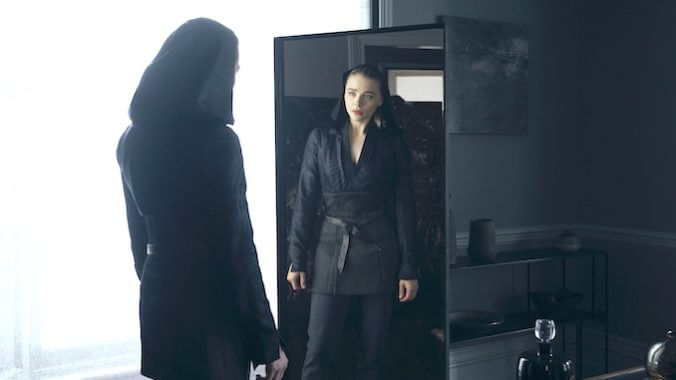Prime Video Sci-Fi Series The Peripheral’s Clever Concept Is Its Greatest Strength
Photo Courtesy of Prime Video
Prime Video’s new science fiction series The Peripheral is based on the 2014 novel of the same name by William Gibson. Considered one of the founders of the cyberpunk genre, Gibson’s writing has influenced countless other books, movies, and TV shows, but has rarely been directly adapted to the screen. Novels like Neuromancer, written before the public internet was even a thing, read as prophetic decades later. Gibson actually quit writing sci-fi in favor of realistic fiction in the 2000s because reality had caught up with his fiction. The Peripheral was his return to inventing new futures, and watching the streaming version eight years later, his vision feels all too plausible.
I say “futures” plural because The Peripheral takes place primarily in two different settings: 2032 North Carolina and 2099 London. The former is a recognizable extrapolation of present-day America, with virtual reality and 3D printing advancing—and poverty, the cost of healthcare, and the drug crisis worsening. Protagonist Flynne Fisher (Chloë Grace Moretz, in the biggest role of her adult career) is living with her terminally ill mother Ella (Melinda Page Hamilton) and her brother Burton (Jack Reynor), a veteran who was subjected to technological experiments and now makes money doing jobs in hyper-realistic videogames.
It’s through filling in for Burton on one of these jobs that Flynne finds herself in the further future. She thinks she’s in a simulation, and given both how convincing we’ve already seen her world’s “sims” to be and how gamelike the experience is in other regards (surprising fighting abilities, a city that’s oddly empty and seemingly filled with NPC-like individuals), viewers have reason to think similarly in the first episode. But in this supposed sim, she can actually feel pain, and by the end of the pilot, she’s had the mind-blowing revelation that she’s not actually in a sim at all, but instead inhabiting a robot body (the titular “peripheral”) in the future.
Not her future, however. Essentially, physical time travel is still impossible, but scientists have found a way via quantum entanglement to send data back and forth in time. Once this data exchange with the past occurs, this past by its very nature splits off into a different universe known as a “stub.” Manipulating these stubs is a pass-time for the wealthy elite of 2099—if anything, Flynne’s life is the “game” being played by these people rather than the other way around. Amidst a complicated web of intrigue, there are those dedicated to helping Flynne and her family in their stub, as well as those set on hurting her.
The world-building in The Peripheral is brilliant. The show itself, which has been adapted by screenwriter Scott B. Smith and executive produced by Westworld’s Jonathan Nolan and Lisa Joy, is merely pretty good. It has the common steaming TV pacing problem where episodes tend to run at least 10 minutes longer than they need to. Despite solid production design and a few attention-grabbing moments of action and body horror, the visuals and direction are never are stunning as those in Westworld, and while the story is not as frustratingly confusing as the latter seasons of Westworld got, it is still convoluted enough that one’s interest can often drift in the season’s middle episodes.